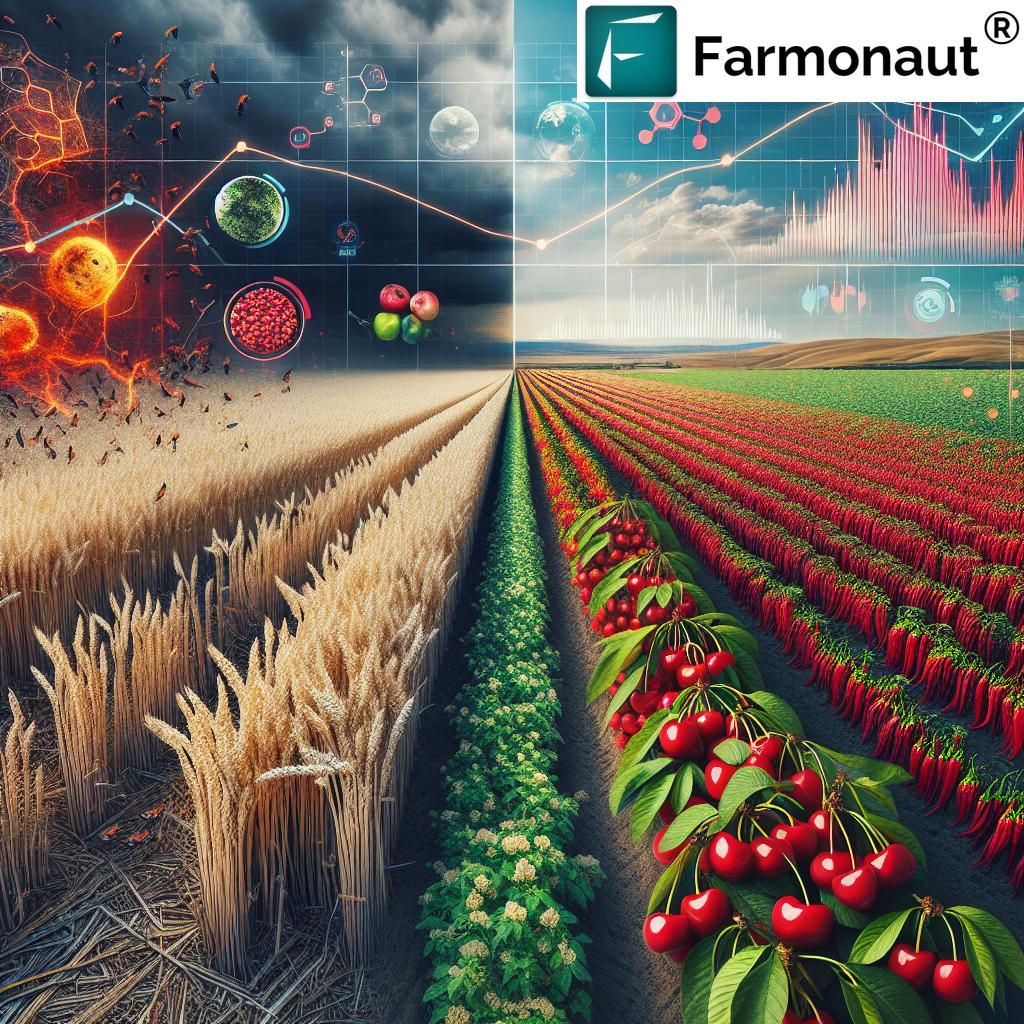Hungary’s Agricultural Crossroads: Import Restrictions, Market Pressures, and Farming Challenges Reshape Industry Landscape
“Hungary is the world’s 3rd largest sour cherry producer, contributing significantly to global supply.”
As we delve into the complex world of Hungarian agriculture, we find ourselves at a critical juncture where policy decisions, market dynamics, and environmental factors are converging to reshape the country’s farming landscape. In this comprehensive analysis, we’ll explore the multifaceted challenges and opportunities facing Hungary’s agricultural sector, from import restrictions to crop farming innovations and livestock management issues.
The Impact of Import Restrictions on Hungarian Agriculture
The recent reintroduction of import restrictions on Ukrainian products has sent ripples through Hungary’s agricultural market. These restrictions, primarily affecting grain and oilseed imports, have sparked international trade tensions and raised questions about the future of EU agricultural trade policies.
- Ukrainian grain exports, which have been a significant source of competition for Hungarian producers, are now facing new barriers.
- The restrictions cover a range of products, including wheat, maize, rapeseed, and sunflower seeds.
- This policy shift aims to protect domestic producers but has implications for market dynamics and international relations.
As we navigate these changes, it’s crucial to understand the broader context of EU agricultural trade policies and their impact on member states like Hungary.

Hungarian Agricultural Sector Trends: A Closer Look
The Hungarian agricultural landscape is undergoing significant transformations, influenced by both internal and external factors. Let’s examine some key trends shaping the sector:
- Farm Size Distribution: There’s a noticeable shift in the structure of farming operations, with implications for productivity and resource allocation.
- Crop Diversity: Hungarian farmers are adapting their crop selections in response to market demands and climate considerations.
- Technological Adoption: The integration of precision farming techniques and digital tools is gaining momentum across the country.
To better understand these trends and optimize agricultural practices, many Hungarian farmers are turning to advanced technologies. Farmonaut’s satellite-based crop monitoring system offers valuable insights into vegetation health, soil moisture levels, and other critical metrics. By leveraging these tools, farmers can make data-driven decisions to improve crop yields and resource management.
Crop Farming Challenges: Navigating Uncertainties
Hungarian crop farmers face a myriad of challenges in today’s dynamic agricultural environment. From climate variability to market pressures, these obstacles require innovative solutions and adaptive strategies.
- Climate Variability: Extreme weather events and shifting patterns are impacting crop yields and quality.
- Pest and Disease Management: Evolving pest populations and new plant diseases pose ongoing threats to crop health.
- Market Volatility: Fluctuating commodity prices and changing consumer preferences create economic uncertainties for farmers.
To address these challenges, many Hungarian farmers are exploring precision agriculture techniques. Farmonaut’s Jeevn AI Advisory System provides personalized recommendations based on real-time data, helping farmers optimize their crop management strategies and mitigate risks.
Livestock Sector: Battling West Nile Fever and Other Hurdles
The Hungarian livestock industry is grappling with significant health challenges, particularly the impact of West Nile fever on animal populations. This mosquito-borne disease has raised concerns among farmers and veterinary authorities alike.
- Symptoms and Spread: West Nile fever can cause neurological issues in horses and other animals, potentially leading to economic losses for farmers.
- Prevention Measures: Implementing effective mosquito control strategies and vaccination programs is crucial for protecting livestock.
- Economic Impact: The disease outbreak has implications for both domestic markets and export potential in the livestock sector.
To combat these challenges, Hungarian farmers are increasingly turning to data-driven solutions. Farmonaut’s platform can assist in monitoring environmental conditions that may contribute to disease outbreaks, enabling proactive management strategies.
Explore Farmonaut’s API for advanced agricultural insights
Hungary’s Position in Sour Cherry Production and Paprika Export Trade Balance
“Hungarian paprika exports have a positive trade balance, with annual export values exceeding €50 million.”
Hungary’s agricultural sector boasts some notable strengths, particularly in sour cherry production and paprika exports. These specialties highlight the country’s potential for niche market dominance and export success.
- Sour Cherry Production: Hungary ranks as a top global producer, leveraging favorable growing conditions and expertise.
- Paprika Exports: The country maintains a positive trade balance in paprika, showcasing its competitive advantage in this spice market.
- Market Opportunities: These successes point to potential areas for further growth and international market expansion.
To capitalize on these strengths and explore new opportunities, Hungarian producers can benefit from Farmonaut’s blockchain-based traceability solutions. These tools ensure transparency throughout the supply chain, building trust with international buyers and potentially opening new export markets.
Access Farmonaut’s API Developer Docs for integration guidance
Agricultural Market Dynamics: Grain Exports and Vegetable Production
The Hungarian agricultural market is characterized by a complex interplay of domestic production, export demands, and international competition. Let’s examine some key aspects of this dynamic landscape:
- Grain Exports: Hungary’s position as a significant grain exporter faces challenges from global market fluctuations and regional competition.
- Vegetable Production: The country’s diverse vegetable sector caters to both domestic consumption and export markets, with opportunities for growth in organic and specialty produce.
- Market Pressures: Balancing production costs, quality standards, and price competitiveness remains an ongoing challenge for Hungarian producers.
To navigate these market dynamics effectively, Hungarian farmers and agribusinesses can leverage Farmonaut’s advanced remote sensing and GIS technologies. These tools provide valuable insights into crop health, yield potential, and market trends, enabling more informed decision-making.
Government Policies Affecting Hungarian Farmers and Producers
The Hungarian government plays a crucial role in shaping the agricultural landscape through various policies and initiatives. These measures have far-reaching implications for farmers, producers, and the overall industry.
- Subsidy Programs: Government support mechanisms aim to bolster specific agricultural sectors and promote sustainable practices.
- Regulatory Framework: Compliance with EU and national regulations influences farming methods and product standards.
- Trade Policies: Bilateral agreements and import/export regulations impact market access and competitiveness for Hungarian agricultural products.
As policy landscapes evolve, staying informed and adaptable is crucial for Hungarian agricultural stakeholders. Farmonaut’s platform can assist in this regard by providing up-to-date satellite imagery and data analytics, helping farmers align their practices with policy requirements and market demands.
Navigating Industry Shifts with Advanced Technologies
As Hungary’s agricultural sector faces these multifaceted challenges, the adoption of cutting-edge technologies becomes increasingly crucial. Farmonaut’s suite of advanced remote sensing and GIS technologies offers powerful tools to help farmers and agribusinesses navigate these industry shifts.
- Crop Yield Optimization: Satellite-based vegetation indices and AI-driven analytics help predict and maximize crop yields.
- Resource Management: Precision farming techniques enabled by Farmonaut’s platform optimize water usage and fertilizer application.
- Risk Mitigation: Early detection of crop stress and disease outbreaks through remote sensing allows for timely interventions.
By leveraging these technologies, Hungarian farmers can make data-driven decisions, improve resilience to market pressures, and adapt more effectively to changing environmental conditions.
Comparative Analysis: Challenges and Opportunities in Hungarian Agriculture
| Aspect | Challenges | Current Status | Opportunities |
|---|---|---|---|
| Import Restrictions |
• Reintroduction of restrictions on Ukrainian products • Potential trade tensions with EU partners |
• Restrictions on grain and oilseed imports • Ongoing debates on policy effectiveness |
• Strengthen domestic market position • Develop new export markets |
| Crop Farming |
• Climate variability impacts • Pest and disease management |
• Shifting crop diversity • Increasing adoption of precision farming |
• Implement advanced remote sensing for crop optimization • Explore climate-resilient crop varieties |
| Livestock |
• West Nile fever outbreaks • Economic losses from animal health issues |
• Ongoing disease management efforts • Investments in veterinary infrastructure |
• Enhance disease monitoring systems • Develop value-added livestock products |
| Export Trade |
• Market volatility • International competition |
• Leading sour cherry producer • Significant paprika exporter |
• Expand niche product markets • Leverage traceability for premium positioning |
| Government Policies |
• Balancing domestic and EU regulations • Adapting to changing subsidy structures |
• Ongoing policy reforms • Focus on sustainable agriculture initiatives |
• Align with EU green policies for funding • Develop public-private partnerships in agtech |
Conclusion: Embracing Innovation for a Resilient Agricultural Future
As we’ve explored throughout this analysis, Hungary’s agricultural sector stands at a critical crossroads. The challenges posed by import restrictions, market pressures, and environmental factors are significant, but they also present opportunities for innovation and growth. By embracing advanced technologies and data-driven approaches, Hungarian farmers and agribusinesses can navigate these complexities and build a more resilient and prosperous agricultural future.
Farmonaut’s comprehensive suite of tools, from satellite-based crop monitoring to AI-driven advisory systems, offers valuable support in this journey. As the industry continues to evolve, the integration of such technologies will be crucial in optimizing yields, managing resources efficiently, and adapting to changing market demands.

The road ahead for Hungarian agriculture may be challenging, but with the right tools and strategies, it’s also filled with potential. By staying informed, adaptable, and open to technological innovations, stakeholders across the agricultural sector can work together to overcome obstacles and seize new opportunities in this dynamic landscape.
Farmonaut Subscriptions: Empowering Hungarian Agriculture
To support Hungarian farmers and agribusinesses in leveraging cutting-edge agricultural technologies, Farmonaut offers flexible subscription options tailored to various needs and scales of operation. Explore our pricing plans below to find the perfect fit for your agricultural endeavors:
Frequently Asked Questions (FAQ)
Q1: How do import restrictions on Ukrainian products affect Hungarian farmers?
A1: Import restrictions on Ukrainian products, particularly grains and oilseeds, aim to protect domestic Hungarian producers from intense competition. This can potentially lead to higher prices for Hungarian agricultural products in the short term, but may also impact trade relations and market dynamics in the longer term.
Q2: What is Hungary’s position in global sour cherry production?
A2: Hungary is the world’s third-largest producer of sour cherries, contributing significantly to the global supply. This position highlights the country’s strength in specialty crop production and its potential for further growth in niche agricultural markets.
Q3: How is West Nile fever affecting Hungarian livestock?
A3: West Nile fever, a mosquito-borne disease, has been impacting Hungarian livestock, particularly horses. The disease can cause neurological issues in animals, leading to economic losses for farmers. It has prompted increased focus on disease prevention and management strategies in the livestock sector.
Q4: What role does paprika play in Hungary’s agricultural exports?
A4: Paprika is a significant export product for Hungary, with a positive trade balance. Annual export values for Hungarian paprika exceed €50 million, showcasing its importance in the country’s agricultural export portfolio and its strong position in international spice markets.
Q5: How can Hungarian farmers benefit from Farmonaut’s technologies?
A5: Farmonaut’s advanced remote sensing and GIS technologies offer Hungarian farmers valuable tools for crop monitoring, yield optimization, and resource management. These technologies provide real-time insights into crop health, soil conditions, and weather patterns, enabling data-driven decision-making and potentially improving agricultural productivity and sustainability.






